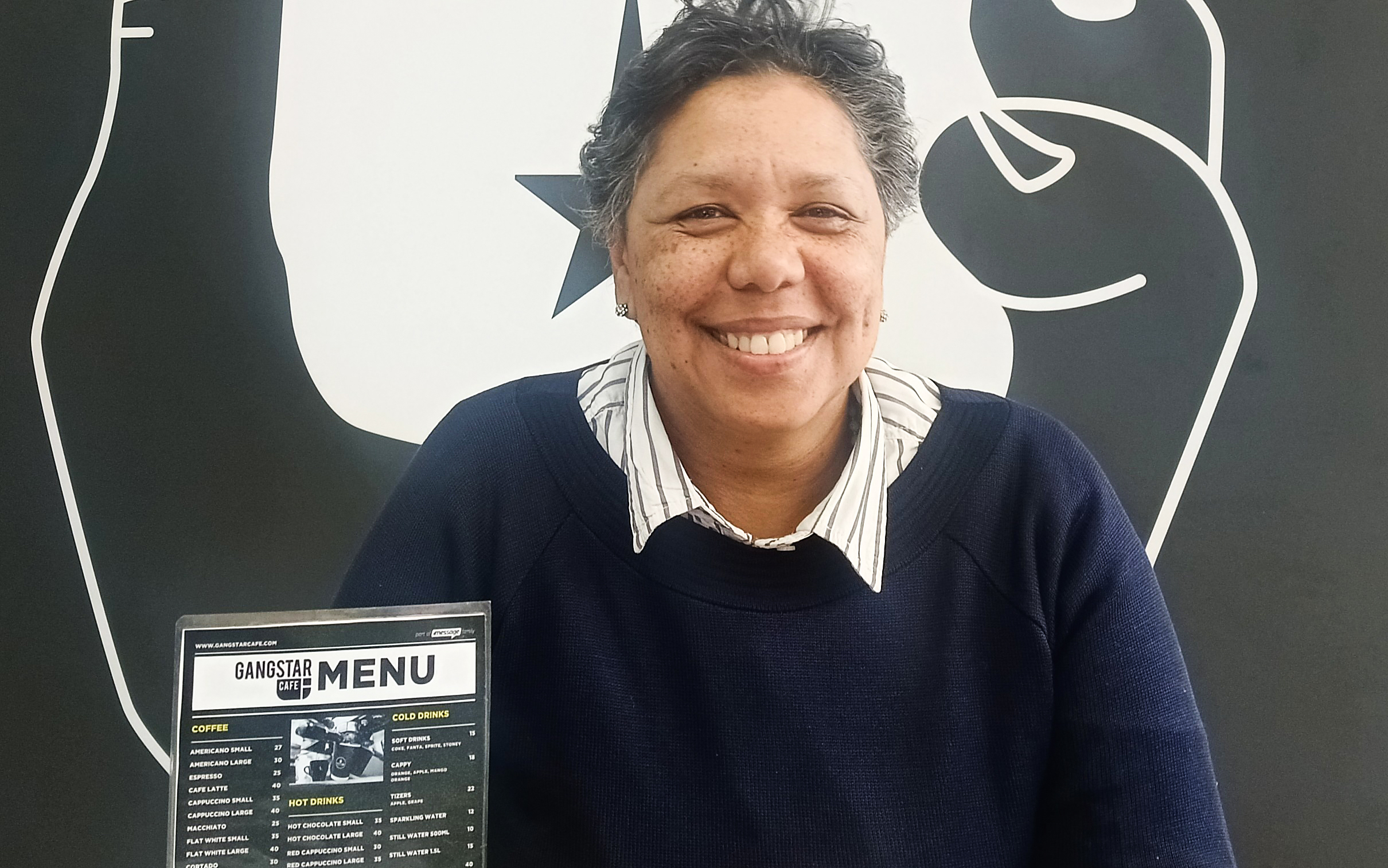Simphiwe Jantjies (55) of Tabakbaai in Saldanha Bay, was imprisoned in 1987 for murder and released on 15 July 1995. Thirty years later, he’s kept his promise to his children that they would not live a life like his.
He has five children. Two work as managers, one is a lawyer, another is a driver, and two are still at school.
This week, Jantjies told Daily Maverick: “If I did not keep my promise, I would probably be in and out of jail. I did it for my children.
“What helped me was those people who supported me while I was in prison, the ones who provided me employment. It is important that every freed prisoner finds work. The prison Number gangs, 26s, 27s, or 28s, cannot get you a job or put food on the table.”
/file/dailymaverick/wp-content/uploads/2025/07/former-26-prison-gang-member-Simphiwe-Jantjies.jpg)
SA’s reoffending rate
Recidivism refers to offenders relapsing into criminal behaviour after being released from correctional facilities.
South Africa’s recidivism rate is among the highest in the world, with estimates ranging from 80% to 97%.
In her recently published thesis, “Breaking the cycle: Examining the socioeconomic and psychological factors in recidivism patterns in South Africa”, Tasné Marshall, a student in the Department of Criminal Justice and Procedure at the University of the Western Cape, explains that “offenders … remain in a cycle of release and rearrest, since current rehabilitation programmes to combat recidivism are less effective than anticipated”.
Between February 2024 and February 2025, 2,395 parolees were released into communities in the Cape Flats, and 254 reoffended, representing a 10.6% recidivism rate in just one year.
In Delft during the same period, 201 parolees were released, with 73 reoffending — a 36.3% recidivism rate.
This was revealed during a recent parliamentary reply from the minister of correctional services, Dr Pieter Groenewald, who underlined a dangerous link between parole policy failures and the ongoing gang and drug wars plaguing the Cape Flats.
According to the DA’s Nicholas Gotsell, a member of the National Council of Province’s Select Committee on Security and Justice, there is a clear link between the lack of rehabilitation in prisons and early release of violent offenders, and the intensification of organised crime in the Cape Flats.
Read more: SA has just one criminologist to deal with prison parole applications, MPs hear
Service delivery inconsistent
Magda Reynolds, the business and development manager at the National Institute for Crime Prevention and the Reintegration of Offenders (Nicro) head office in Cape Town, told Daily Maverick that when looking at recidivism rates, it is necessary to interrogate the factors that contribute towards crime and violence.
“There are different ones that operate at the individual, family and community levels. They range from generational trauma, substance abuse, dysfunctional families, disorganised communities, economic climate, etc,” she said.
“In South Africa, we do have services that address these risk factors at the three levels, but service delivery is ad hoc, inconsistent, often of short term due to funding constraints, and not delivered at sufficient scale for us to see the impact. This is where organisations, such as Nicro’s, services become essential.”
She said Nicro works at the heart of offender reintegration, and its programmes aim to address the underlying causes of criminal behaviour, be it poverty, lack of education, substance abuse, trauma, or absence of positive role models.
“We work directly with offenders, both in and outside of the criminal justice system, to facilitate real behavioural change and reduce the likelihood of reoffending.”
Finding work is critical
Despite the bleak picture, some former convicted prisoners do defy the odds and never return to prison.
This week, Jantjies recalled the hardship he faced after being released from prison.
“When I came out of prison, I was seen as a murderer and an American gang member. It wasn’t easy to adapt and be accepted by the community. The first thing I did was go to all my victims and say, ‘I’m sorry. I’m out, I’ve served my sentence. I hope you can forgive me.’
“I had to make peace with whatever people say about me and had to move on with my life. The first thing I did was get a job,” he explained, saying those who supported him while he was in prison helped him get a job on a boat.
He said not finding a job is one of the reasons why so many released offenders return to prison, to a family they feel they belong to.
“People could see I was doing something different. I’m no longer standing on a corner. I’m no longer stabbing people in the streets, and there were no house break-ins.”
Jantjies has worked at several companies, including Sea Harvest, and is presently self-employed in the construction business. He is involved in youth soccer development and during the 2011 local elections lost out on being a councillor for Ward 4 in Tabakbaai.
His message to released prisoners who are struggling is to reject the notion that prison has transformed you into someone with a number and power.
“When I talk to prison gang members who have been released, I draw them a table. I will write down the UIF and provident fund and the prison number at the very bottom.”
“At the top of the page, I write 28s, 26s, 27s and the working person next to it.”
He then asks them which job a gang member can get before explaining that gangs don’t lead to employment.
“Just two things: prison and death.”
‘Do not be idle’
Another former convict is Steven “Spider” Harold (56) from gang-ravaged Bishop Lavis in Cape Town. He was sentenced to six years in 1987 after being found guilty of assault with the intent to cause grievous bodily harm (GBH).
He was released in 1990, but in 1994, he was arrested again and convicted on four counts of assault GBH, receiving a 16-year jail sentence. In prison, he joined the 28s gang.
He was released in 2004. Returning to Bishop Lavis and being accepted wasn’t easy, he said.
He was employed at a car dealer for 18 months, after which he worked on a casual basis.
/file/dailymaverick/wp-content/uploads/2025/07/28s-prison-gang-member-Steven-Harold.jpg)
“When I didn’t have a job, I smuggled drugs for a long time. I did this because I had no income and my children were very young. Luckily, I was never arrested. Police raided my house several times but found no drugs.
“At the age of 40, I decided to [turn over] a new leaf. Many people offered me up to R50,000 to carry out armed robbery, but I resisted,” he said.
His message to released prisoners is: “Prison is a dangerous place. If you are sentenced today, you are not sure if you will be able to open your eyes tomorrow. Finding work or getting involved in community work is one way to ensure you never end up in prison again. Do not be idle and revert to your bad habits.”
A beacon of hope
/file/dailymaverick/wp-content/uploads/2025/07/Ingrid1.jpg)
The remarkable work done by the Gangstar Café, a social enterprise of the Message Trust, in Mowbray, Cape Town, includes engaging offenders within prison, providing training and aiding in parolees’ reintegration by hiring them.
Inside the cafe, there is a cosy ambience and the aroma of coffee, which comes from Brazilian Santos beans roasted in-house.
The staff preparing your coffee and making your sandwich are all former convicts.
Gangstar Café’s Ingrid Kalie-Moses said: “We run programmes at the Drakenstein Correctional Service Facility. We’ve already prepared them for some of the experiences they’ll have outside of prison. We also provide an opportunity to find that through our job readiness course.” DM





 Ingrid Kallie-Mosed from Gangstar Cafe says part of their training in prison is to help ex-offenders find employment once released from prison. (Photo: Vincent Cruywagen)
Ingrid Kallie-Mosed from Gangstar Cafe says part of their training in prison is to help ex-offenders find employment once released from prison. (Photo: Vincent Cruywagen)